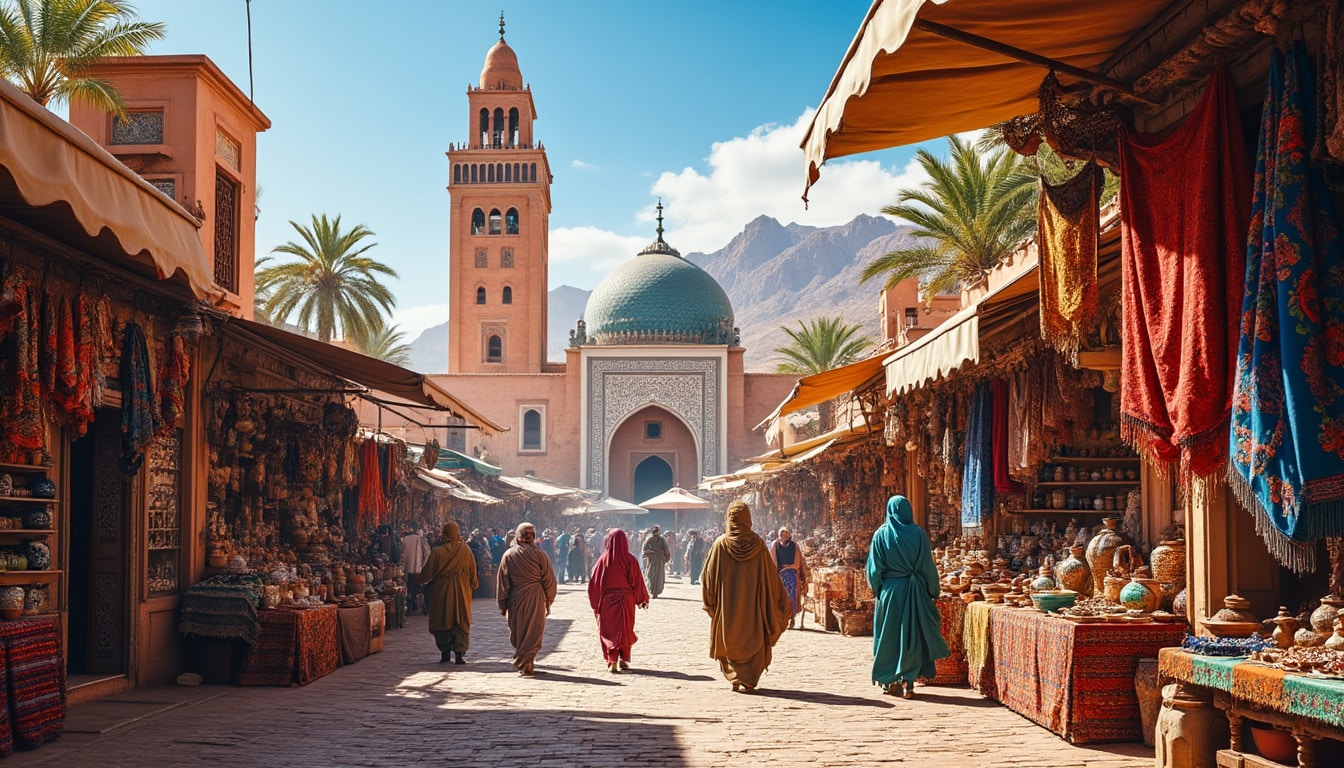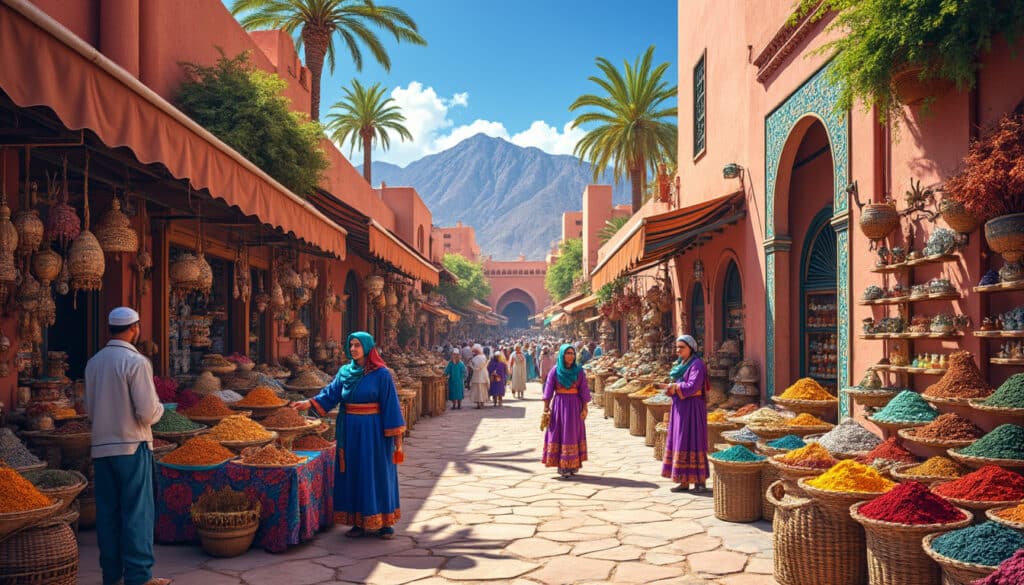Marrakech, the enchanting “Red City” of Morocco, is like a multifaceted jewel that gleams under the North African sun. With its rich history, colorful culture, and architectural marvels, the city is a place where the past and present coexist in a harmonious dance. Visitors to Marrakech are often captivated by the city’s vibrant medina, bustled with bustling souks, where the aroma of spices mingles with the sound of traditional Moroccan music. But Marrakech is more than just a tourist hotspot; it’s a tapestry woven with stories of empires, dynasties, and age-old traditions. From its founding by the Almoravids in 1062 to its role as one of Morocco’s former imperial cities, Marrakech is a destination that offers a journey through time. Not only does it boast stunning architecture like the Bahia and Badi Palaces, but it’s also home to lush gardens, thriving artisan communities, and a culinary scene that tantalizes the senses. Discover the fascinating facts and curiosities that lie within its terracotta walls and explore the unique allure that makes Marrakech a place like no other.
The Historical Legacy of Marrakech: From Almoravid to Imperial Splendor
Marrakech stands as one of Morocco’s former imperial cities, with a history that stretches back to its founding by the Almoravids in 1062. This nomadic Berber dynasty chose the site for its strategic position and abundant water resources, making it the empire’s vibrant capital. The city’s name, derived from the Berber words “amur akush” – meaning “land of God” – reflects its enduring spiritual significance.
| Dynastic Influence | Impact on Marrakech | Period |
|---|---|---|
| Almoravid Dynasty | Established as the capital, architectural foundations laid | 11th century |
| Almohad Caliphate | Koutoubia Mosque constructed, fortifications enhanced | 12th century |
| Saadian Dynasty | Saadian Tombs erected, flourishing arts and architecture | 16th century |
During the 12th century, the Almohads further refined the city’s layout, constructing the iconic Koutoubia Mosque and enhancing its defensive walls. This era marked a period of cultural and architectural flourishing. The Saadian dynasty, centuries later, brought about a renaissance in the arts, commissioning the exquisite Saadian Tombs that are admired to this day.
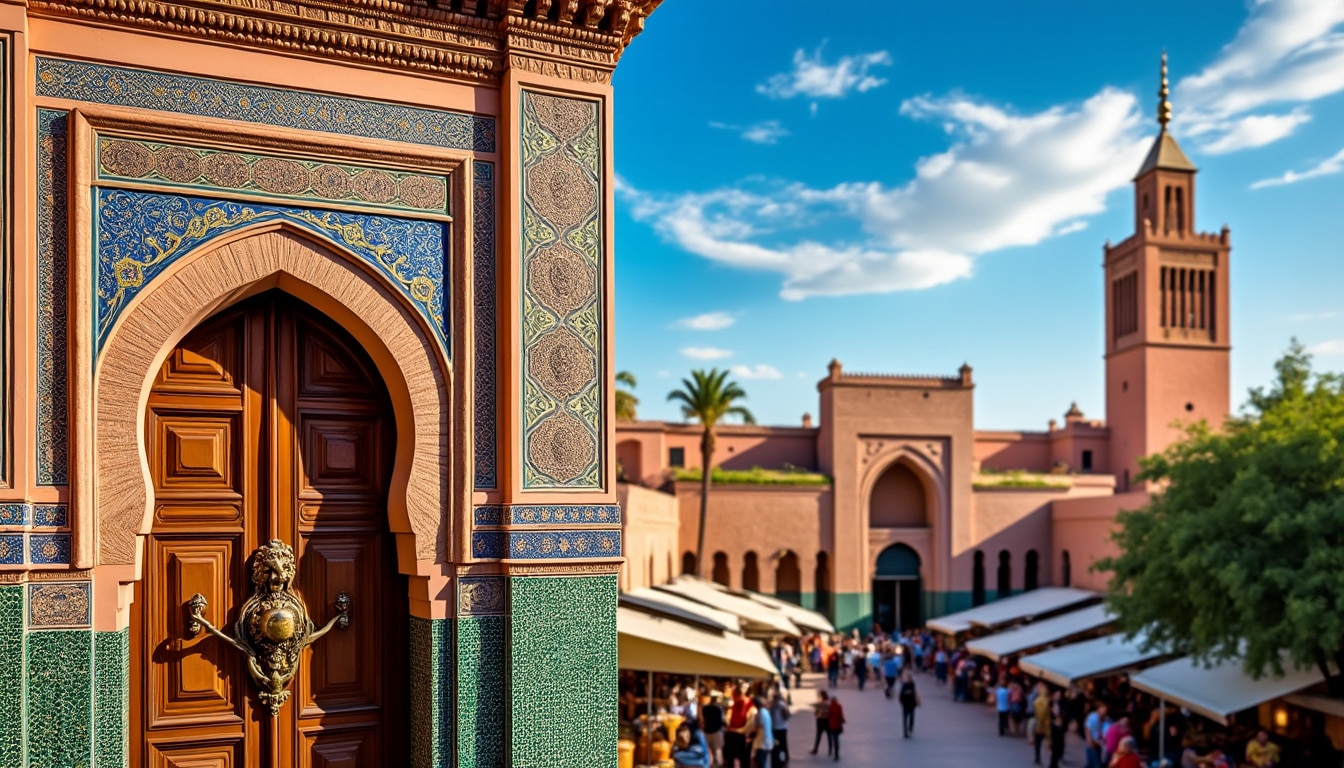
As a tapestry of dynastic eras, Marrakech served as Morocco’s heart of art, religion, and trade. Its status as an imperial city was solidified through landmarks such as the Bahia and Badi Palaces, each a symbol of past grandeur. The city’s evolution from a fortified stronghold to a bustling hub encapsulates the dynamic forces that shaped its history.
The Allure of Marrakech’s Architectural Wonders
Marrakech is synonymous with stunning architecture, from the grandiose Bahia Palace to the understated elegance of the Majorelle Garden. Each structure tells a story of the city’s rich past and intricate artistry.
Bahia Palace: Brilliance and Grandeur
Constructed in the late 19th century, the Bahia Palace covers nearly 20 acres and embodies the opulence that characterized Moroccan royalty. Designed by a father-son duo, its name, meaning “brilliance,” aptly captures its splendor. The palace’s intricate woodwork, elegant stucco carvings, and lush gardens impart a sense of timeless beauty.
- 🌿 Gardens: Extensive and lush, adding to the palace’s ethereal beauty.
- 🏛️ Architecture: Features exquisite Moroccan design elements and motifs.
- 🎨 Craftsmanship: A showcase of traditional artisanship.
The Intricacies of the Koutoubia Mosque
The Koutoubia Mosque is not only Marrakech’s spiritual center but also a masterpiece of Almohad architecture. Its 230-foot minaret is a beacon visible from nearly every corner of the city. While non-Muslims cannot enter, the mosque’s exterior offers a visual feast with its harmonious proportions and intricate details.
The mosque stands as a symbol of Marrakech’s rich Islamic heritage and its enduring role in Moroccan culture. Its calling to prayer echoes across the city, marking the rhythm of daily life.
Immersing in these iconic architectural wonders, visitors gain a profound appreciation for the artistic achievements and cultural narratives that make Marrakech an unforgettable destination.
The Vibrant Marketplace: Souks and Bazaars of Marrakech
No visit to Marrakech would be complete without a journey through its vibrant souks. These traditional markets offer a sensory experience like no other, where colors and aromas collide in a lively display of Moroccan craftsmanship. The bustling Marrakech Souk is a labyrinth lined with stalls selling everything from spices to exquisite textiles and intricate ceramics.
| Market | Specialty | Attraction |
|---|---|---|
| Souk Semmarine | Clothing and textiles | Beautifully woven carpets |
| Souk Chouari | Woodwork | Handcrafted furniture |
| Souk El Kebir | Leather goods | Handbags and garments |
These marketplaces not only cater to shoppers but also serve as cultural hubs where artisans reveal their talents. Each souk specializes in traditional crafts—whether it’s the delicate woodwork at Souk Chouari or the colorful textiles at Souk Semmarine.
The medina, Marrakech’s historic heart, is the place where locals and tourists alike converge. The interplay of negotiation and hospitality is a dance as interactive as the musical sounds that fill the air.
Whether it’s a handcrafted piece of jewelry, intricately patterned fabrics, or a taste of street food, the Marrakshi souk experience is an adventure that leaves lasting impressions.
The Role of Nature and Gardens in Marrakech’s Charm
Marrakech’s enchantment is not only derived from its buildings but also from its splendid gardens. Areas like the Menara Gardens and Jardin Majorelle provide serene retreats from the city’s vibrant tempo.
Majorelle Garden: A Blend of Nature and Art
Originally designed by the French painter Jacques Majorelle and later restored by designer Yves Saint Laurent, the Jardin Majorelle is a vivid masterpiece combining art and horticulture. The garden’s cobalt blue buildings and exotic plant collections make it an oasis of tranquility amidst Marrakech’s bustling environment.
- 🌵 Diverse Flora: Houses a vast selection of cacti and other exotic plants.
- 🎨 Cultural Heritage: Home to the Berber Museum, showcasing traditional artifacts.
- 📸 Visual Delight: Offers picturesque views ideal for photography enthusiasts.
Menara Gardens: Reflecting Tranquility
The Menara Gardens date back to the 12th century and were designed as a peaceful retreat for sultans. Set against the backdrop of the Atlas Mountains, the gardens provide a soothing ambiance, perfect for leisurely walks.
These gardens emphasize the importance of nature in Marrakech’s cultural landscape, offering a balance to the lively energy of the city streets. They capture the essence of relaxation and contemplation, inviting visitors to connect with the natural splendor that surrounds them.
Exploring these green sanctuaries reveals an often-overlooked side of Marrakech—a side that complements its architectural brilliance with natural beauty.
The Culinary Delights and Cultural Tapestry of Marrakech
Beyond its sights and sounds, Marrakech is a city of flavors. Its culinary scene is a melting pot of influences, where traditional dishes blend with global tastes. A key feature of Moroccan hospitality is its emphasis on food, with communal meals acting as the centerpiece.
Marrakshi cuisine is renowned for its distinctive flavors and regional specialties. Dishes like tagine and couscous are as much a part of the city’s identity as its landmarks. For an authentic experience, consider the local meal times and join in on a Friday couscous gathering, a cherished tradition among locals.
The Symbolism of Mint Tea
No visit would be complete without indulging in mint tea, a staple in Moroccan culture. Known as “atay,” this sweet and refreshing brew is a token of hospitality, often shared during social gatherings. It’s more than just a drink—it’s a ritual that strengthens social bonds.
- 🍃 Ingredients: Green tea, fresh mint, copious sugar.
- 🫖 Serving Tradition: Poured from a height to enhance its flavor and show hospitality.
- 👐 Social Ritual: A symbol of warmth and friendship.
Marrakech’s food scene is where tradition meets innovation, offering both classic Moroccan favorites and modern fusions. With an emphasis on fresh, local ingredients, dining in Marrakech is an experience that engages all the senses.
For those seeking authentic culinary adventures, explore these recommended local eateries and enjoy the city’s gastronomic delights!
Marrakech’s Cultural Influence through Music and Art
Marrakech is not only a feast for the palate but also a feast for the soul. The city is a vibrant hub for music and art, where traditional Marrakchi music thrives. Visitors can experience this local genre through live street performances and festivals.
The infectious rhythms and lively beats capture the essence of Marrakech’s cultural richness, serving as a reminder of its long-standing tradition as a center of artistic expression. This blend of culinary and cultural elements makes Marrakech an enduring destination for travelers seeking a holistic experience.
- 🎶 Music: Marrakchi folk music with unique instruments like the guimbri lute.
- 🎭 Art Events: Regular exhibitions and open-air performances.
Whether through its vibrant souks, tranquil gardens, or mouth-watering delicacies, Marrakech continually enchants visitors, leaving them eager to delve deeper into its mysteries.
Frequently Asked Questions about Marrakech
- Q: What is the best time to visit Marrakech?
- A: The best time to visit is during spring (March to May) and fall (September to November) when the weather is pleasant, and outdoor activities are comfortable. For more weather details, check Marrakech weather.
- Q: What should I wear when visiting Marrakech?
- A: Modest clothing is recommended out of respect for local culture. Lightweight, breathable fabrics are ideal due to the warm climate.
- Q: How do I navigate the Marrakech Souks?
- A: It’s advisable to visit with a local guide who can help you explore and haggle effectively. Learn more about navigating the markets on Marrakesh souvenir shopping.
- Q: What language is spoken in Marrakech?
- A: Arabic is the official language, but French is widely spoken. English is commonly understood in tourist areas. For more on communication, visit Marrakech languages.
- Q: Are there any recommended places to stay?
- A: Marrakech offers a variety of accommodations, from luxury hotels like La Mamounia and Royal Mansour to charming riads in the medina.
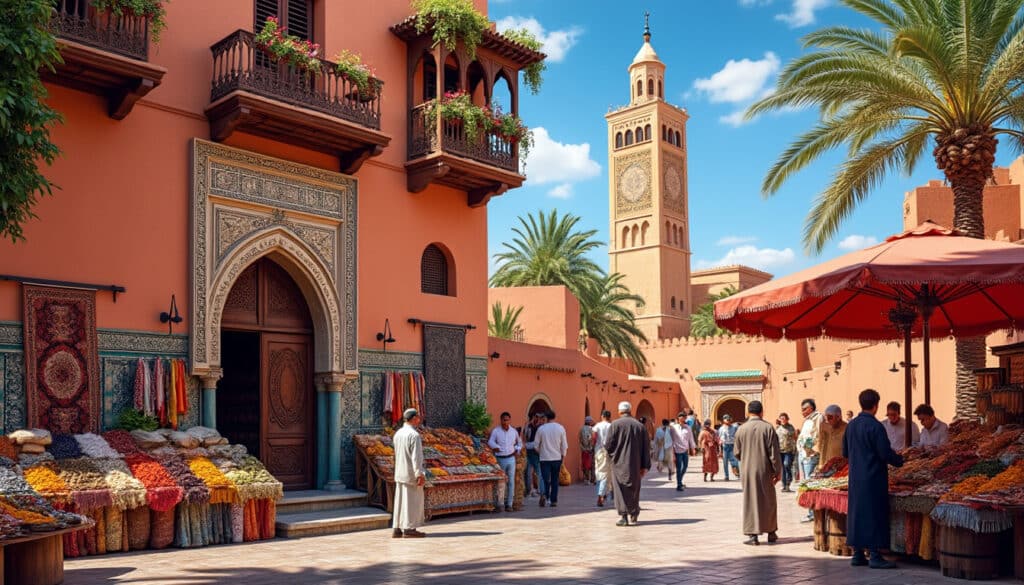
Architecture and urban features of Marrakesh
Marrakesh, a city bursting with energy and colors, serves as a monumental reflection of centuries of history and blending of cultures. Known for its unique architecture, Marrakesh embodies a fusion of Islamic, Berber, and French colonial styles that delightfully merge…
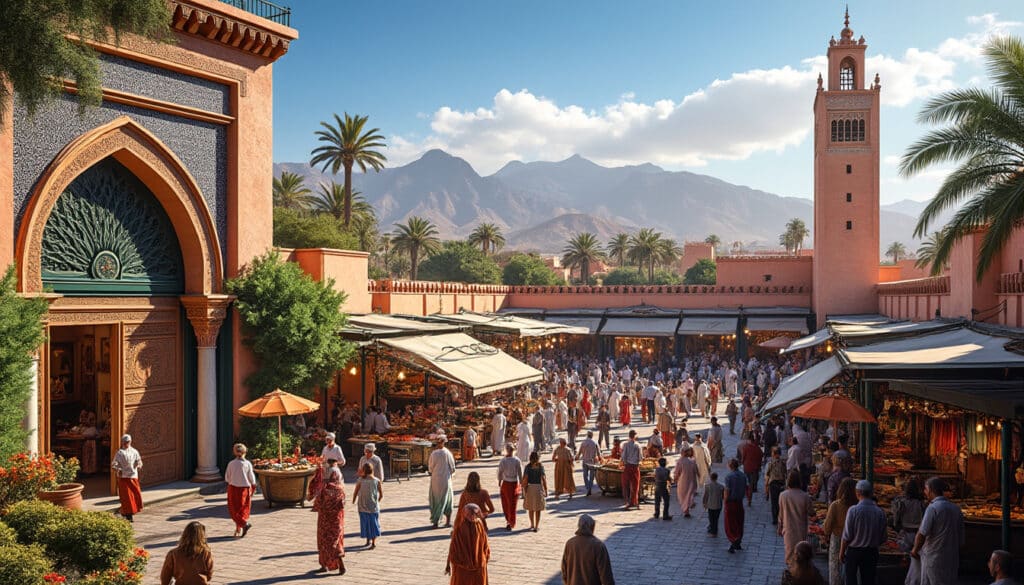
Marrakesh, often called the “Red City,” is a bustling hub of culture and history in Morocco that enchants visitors with its vibrant medinas, stunning architecture, and rich heritage. Nestled at the foothills of the Atlas Mountains, this city is not…
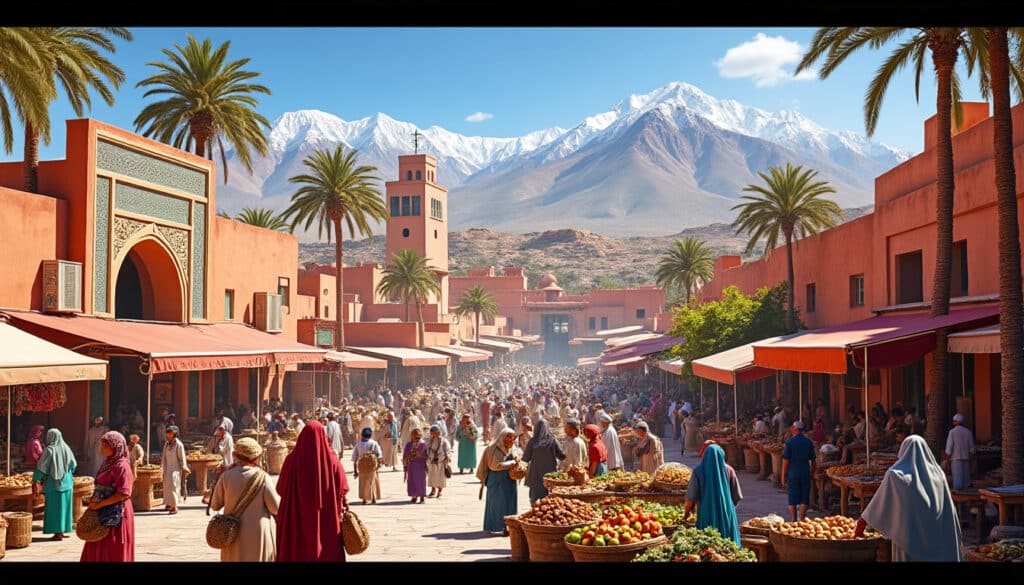
Demographics and geography of Marrakesh
Marrakesh is one of the most vibrant cities in Morocco, a hub of culture, history, and geographical diversity. Located at the foothills of the Atlas Mountains, this city boasts a unique blend of traditional and modern influences that reflect in…
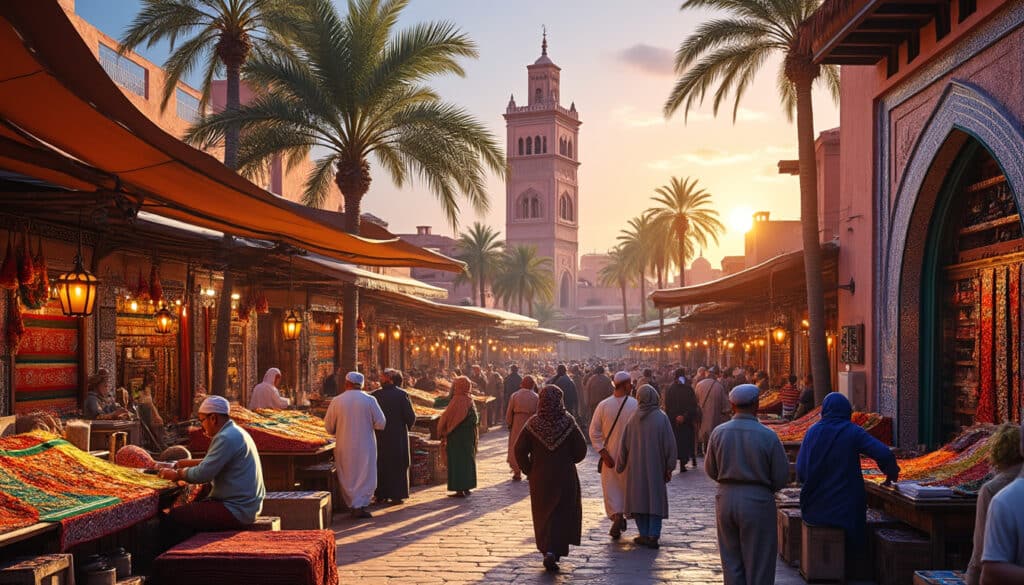
The Origins of Marrakesh: Birth of the Red City Founded in the mid-11th century, Marrakesh is a city steeped in rich history. Originally established as a military camp by the Almoravid dynasty, a confederation of Berber tribes, Marrakesh quickly evolved…
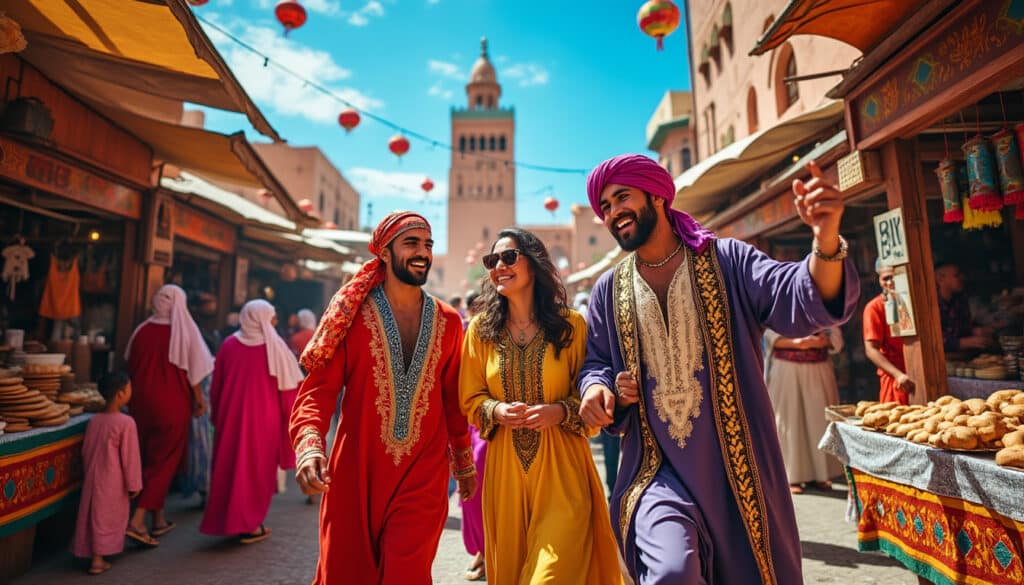
Holidays and celebrations in Marrakesh
Immerse yourself in the vibrant tapestry of Marrakesh, a city brimming with an extraordinary array of holidays and celebrations. From the bustling souks to historic landmarks like the Koutoubia Mosque and the enchanting Majorelle Garden, Marrakesh offers a captivating backdrop…
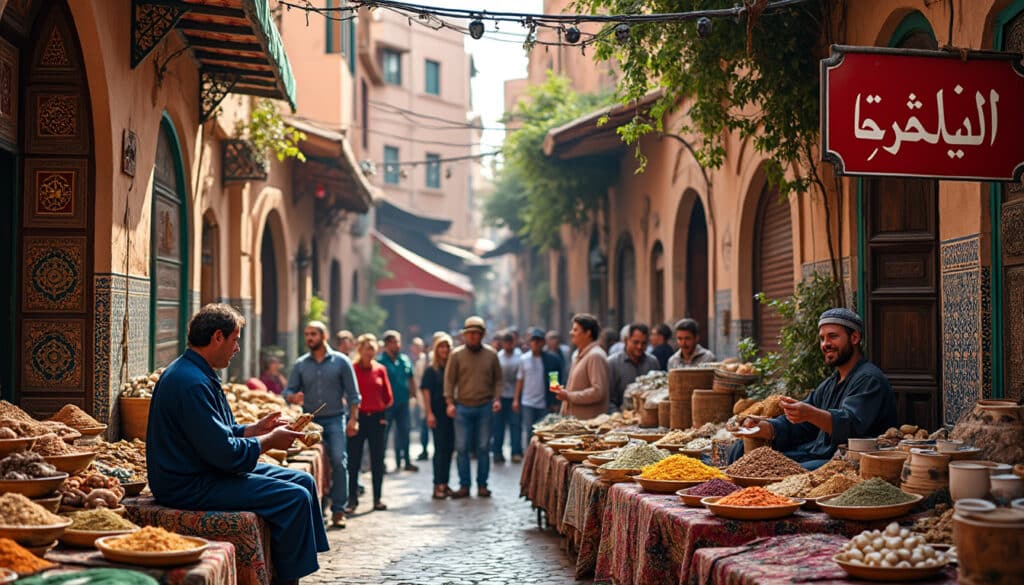
Language and spelling of Marrakesh
The city of Marrakesh, often also spelled as Marrakech, is more than just a destination known for its vibrant souks and stunning palaces. It’s a melting pot of cultures, languages, and history that reflect the dynamic interplay of evolution and…
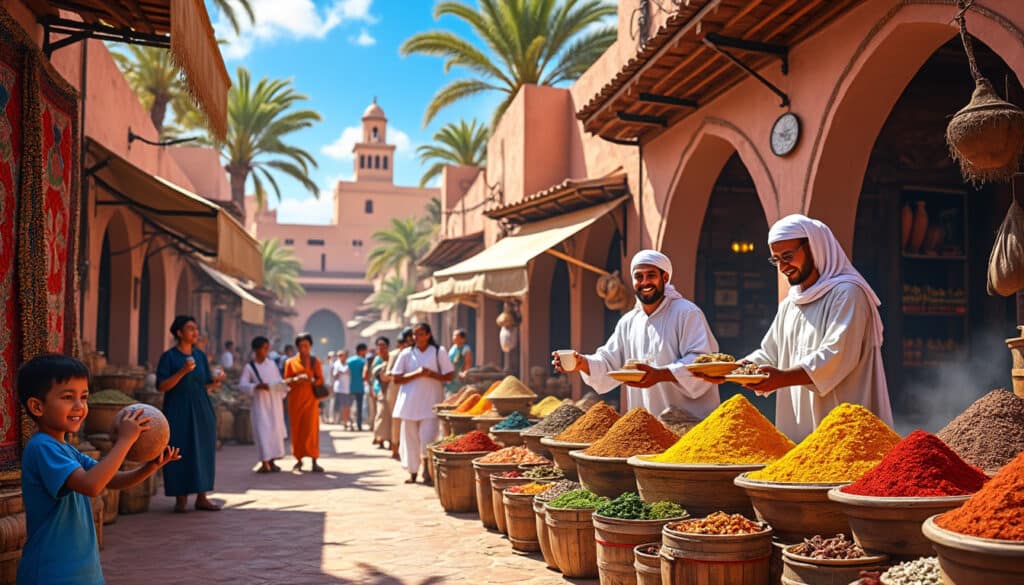
Local tips for tourists in Marrakesh
Marrakech, the captivating heart of Morocco, enchants visitors with its vibrant souks, stunning palaces, and aromatic cuisine. Known as the “Red City” due to its distinctive ocher walls, Marrakech offers a whirlwind of sensory delights that can both overwhelm and…
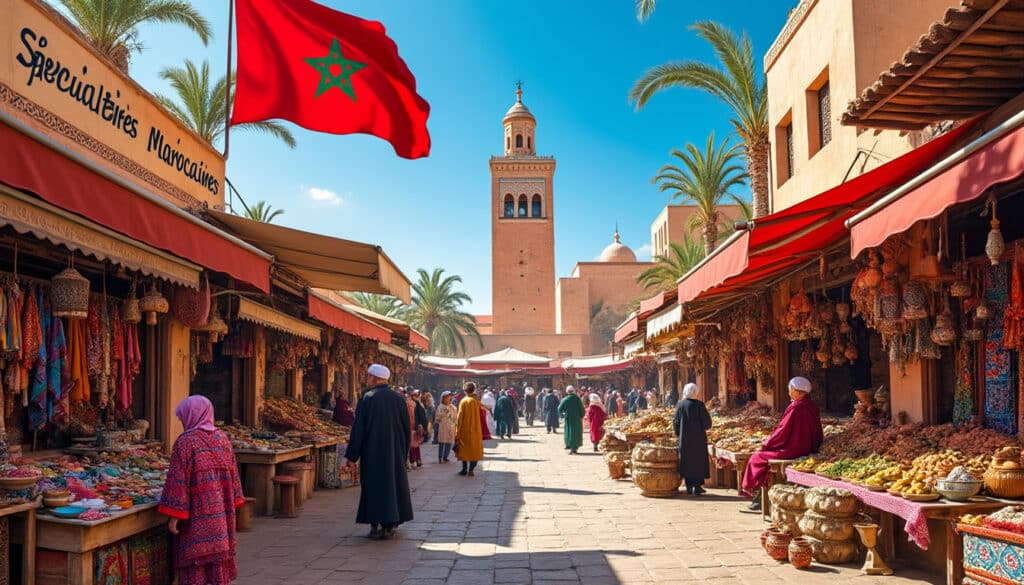
Names, flags, and identity of Marrakesh
Marrakesh, a city steeped in history and vibrant culture, is a tapestry of visual and symbolic elements that resonate with both locals and visitors alike. Known as the “Red City,” Marrakesh is an enchanting fusion of ancient traditions and modern…
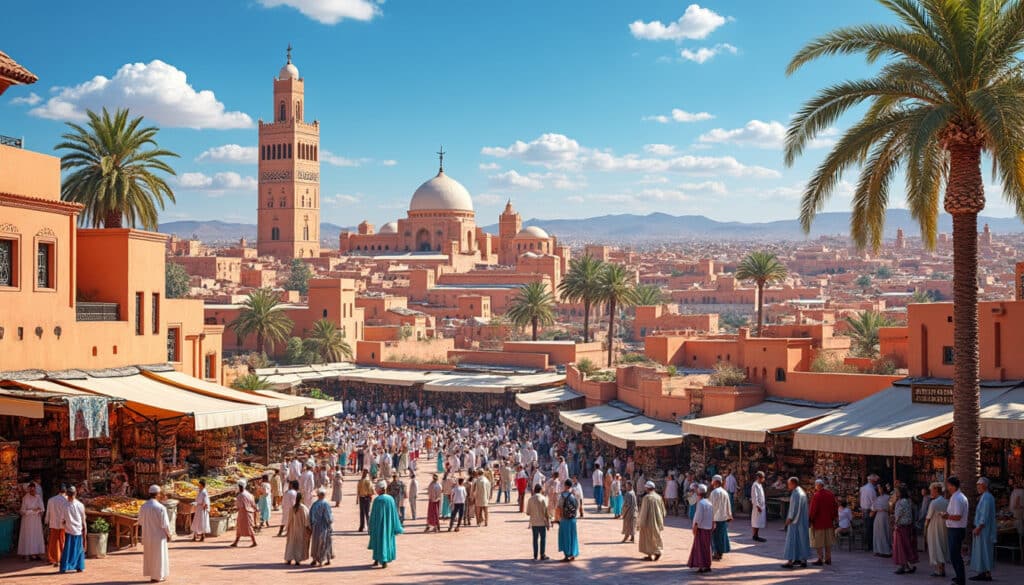
Reputation and identity of Marrakesh
Marrakesh, the “Red City” of Morocco, is a symphony of history, culture, and sensory experiences, where ancient traditions and modern lifestyles coexist beautifully. The city, with its vibrant marketplaces and iconic landmarks, offers a fascinating insight into Moroccan life. Each…
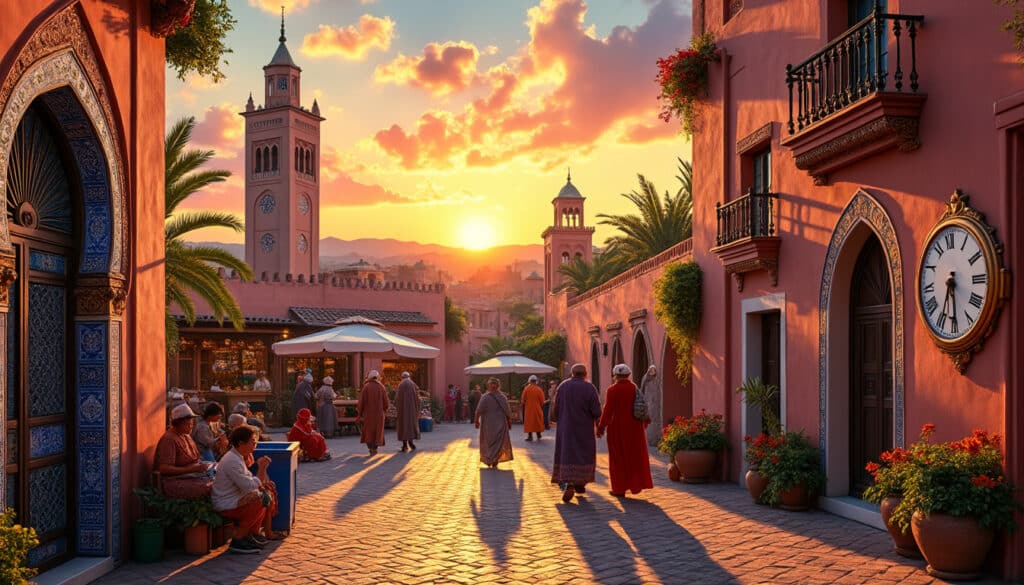
Time and time zone in Marrakesh
Marrakesh, a vibrant blend of history and culture, is a destination that attracts countless travelers every year. Whether you’re planning to experience the labyrinthine souks or explore its majestic palaces, understanding Marrakesh’s local time and timezone is essential for making…

Unusual facts and social issues in Marrakesh
Marrakesh, the captivating “Red City” of Morocco, is not only renowned for its vibrant souks and stunning architecture, but also for its unique blend of cultural and social dynamics that make it a hub of intrigue and diversity. Known for…

What does Marrakesh look, smell, feel like?
Known as the “Red City,” Marrakesh captivates all who visit with its sensory tapestry, created by the intertwining of sights, sounds, smells, flavors, and textures. A city known for its vivid colors, historical richness, and cultural diversity, Marrakesh draws explorers,…

